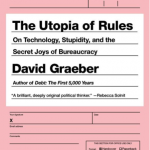ROBOTS WILL TAKE YOUR BULLSHIT JOB
March 18, 2015
 Before I would like to talk about David Graeber, his essay “On the phenomenon of bullshit jobs” and his recently published book “The Utopia of rules: On Technology, Stupidity, and the Secret Joys of Bureaucracy“, we should first remember what robots and AI are doing. They are eating our jobs. And that’s good; it’s why we have automation in the first place. Machines in, people out. For years it has been like this. The anxiety nowadays is about the speed at which computers take over. Just as reminder, this chart shows the likability of a robot taking over any kind of job in the next two decades. Based on the famous Oxford study The Future of unemployment: How susceptible are jobs to computerisation?more–>
Before I would like to talk about David Graeber, his essay “On the phenomenon of bullshit jobs” and his recently published book “The Utopia of rules: On Technology, Stupidity, and the Secret Joys of Bureaucracy“, we should first remember what robots and AI are doing. They are eating our jobs. And that’s good; it’s why we have automation in the first place. Machines in, people out. For years it has been like this. The anxiety nowadays is about the speed at which computers take over. Just as reminder, this chart shows the likability of a robot taking over any kind of job in the next two decades. Based on the famous Oxford study The Future of unemployment: How susceptible are jobs to computerisation?more–>
And this might even be a conservative guess. The Dutch RDW, the organization responsible for supervising cars on the road and mobility systems, predicts that in 2030 approximately 50% of the cars will be self-driving. That would add cab- and truck drivers to the list, and many other jobs in logistics.
On the phenomenon
Much more than being worried about our jobs, we should look at what the technology is doing. How technology is changing our society. That’s the whole point professor David Graeber, anthropologist at the London School of Economics is making. But first his good news. A lot of the jobs today are just bullshit. They shouldn’t exist in the first place. Graeber:
“How can one even begin to speak of dignity in labour when one secretly feels one’s job should not exist?”
I’m not sure about my own job, but I must admit that some parts, and even a growing part of my job, I could consider pointless. In his essay “On the phenomenon of bullshit jobs“, David Graeber gives an example: take for instance corporate lawyers. Talk to one and he will easily admit that what he’s doing is bullshit. And while he’s so busy with that, he doesn’t have time to walk his dog for instance. So that’s why new companies offer services for walking your dog. Get the point? These kind of companies fall into the same category: useless, waste of time, bullshit.
Total Bureaucratization
In essence, according to David Graeber, a waste of time and stupity go hand in hand with bureaucracy. The book, The Utopia of rules, describes we are entering (already have entered) the era of total bureaucratization. Graeber:
“All rich countries now employ legions of functionaries whose primary function is to make poor people feel bad about them selves […] Much of what bureaucrats do, after all, is evaluate things”
I’ve got quite some friends working in healthcare and education. They’re spending less and less time helping people, and more time serving the system. Bureaucracies, in Graeber’s words, are not themselves forms of stupidity, but ways of organizing stupidity. I would say mediocrity is the real evil here.
Total Airbnb-zation
Personally, I’m not worried about the future of jobs. Like automation – people out, machines in – we’ve seen a long history of – old jobs out, newly invented ones in. The positive take on what David Graeber is saying, is that much of what we consider a waste of time, can be automated. If I had better technical skills, I could almost build the apps myself that would make my working life easier. It would have the same look and feel like Airbnb, beautifully designed, peer-to-peer human-like, a great experience, and the same kind of intelligence as Watson. Robots and AI are replacing the bureaucrats. Let’s hope that the persons creating this new breed of machines come with a better version of mankind and improve society. Kindness can be programmed into our robot systems.

 English | EN
English | EN 
